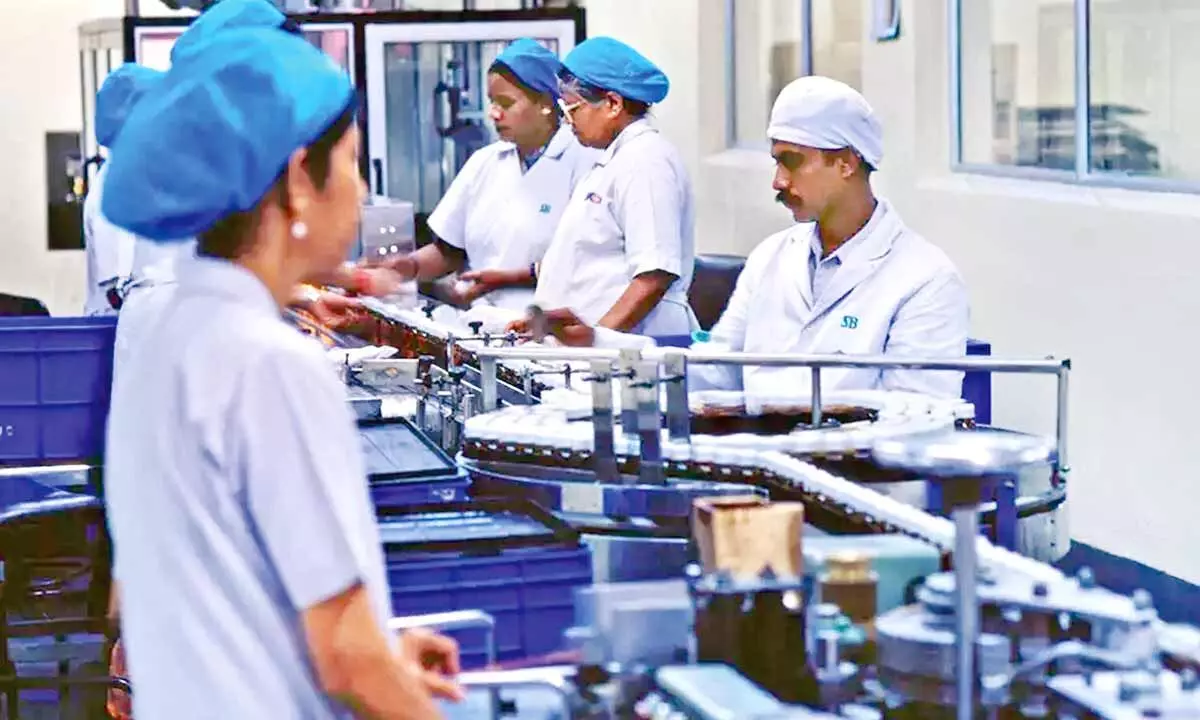Centre should further strengthen PLI scheme to pep up pharma sector
This will boost domestic manufacturing of identified KSMs, DIs and APIs and effectively reduce dependence on imports, especially from China, in critical APIs
image for illustrative purpose

That the pharmaceutical industry in the country has welcomed the scheme with open arms gets evidenced from the fact that 278 applications were received in four rounds. Of them, 51 have been approved with committed investment of Rs 4,138.41 crore against which investment of Rs 1,707 crore has already been incurred. These 51 projects are expected to generate more than 10,000 jobs
In a clear indication that the central government’s Production Linked Incentive (PLI) Scheme for the pharmaceutical industry is a huge success, the government has announced that the projects commissioned under the scheme till December 2022 have seen an investment exceeding the total committed investments.
The Department of Pharmaceuticals (DoP), which is implementing the scheme, has revealed that under the PLI for promotion of domestic manufacturing of critical Key Starting Materials (KSMs)/ Drug Intermediates (DIs)/ Active Pharmaceutical Ingredients (APIs), approximately 21 projects have been commissioned with actual investment of Rs 890.82 crore as against total committed investment of Rs 843.79 crore.
It is now clear that the scheme if one goes by the 21 projects coming up, including capacities for manufacture of over 25,000 MT of Para Aminophenol and around 4500 MT of 1,1 Cyclohexane Diacetic Acid (CDA) till the end of December, 2022. According to data from DoP, capacities for 21 bulk drug facilities from various pharmaceutical companies have been set up, including Meghmani LLP's facility to manufacture Para Amino Phenol, the raw material for several drugs including paracetamol, with installed capacity of 13,500 MT; Sadhna Nitro Chem Ltd's facility for Para Aminophenol with installed capacity of 12,000 MT; Hindys Labs Pvt Ltd' s 3000 MT facility for 1,1 Cyclohexane Diacetic Acid (CDA), an ingredient for anti-depressant drug Gabapentin; and Emmennar Pharma's CDA facility with a capacity of 1,500 MT. The other facilities set up under the PLI scheme include Centreient Pharmaceuticals India's Atorvastatin (installed capacity of 180 MT); Andhra Organics Ltd's Sulfadiazine (360 MT); Hetero Drugs Ltd's Oxcarbazepine (195 MT), Levofloxacin (230 MT), Carbidopa (16 MT), and Levodopa (40 MT); Dasami Lab's Cabamazepine (260 MT), and Oxcarbazepine (195 MT); Honour Lab's Lopinavir (49 MT), Valsartan (300 MT), and Levetiracetam (840 MT); Hindys Lab's Acyclovir (525 MT); Globela Industries' Norfloxacin (60 MT), and Ofloxacin (100 MT); Anasia Lab's Losartan (400 MT), and Olmesartan (75 MT); and Hazelo Lab's Vitamin B6 (70 MT) plants.
That the pharmaceutical industry in the country has welcomed the scheme with open arms gets evidenced from the fact that 278 applications were received in four rounds. Of them, 51 have been approved with committed investment of Rs 4,138.41 crore against which investment of Rs 1,707 crore has already been incurred. These 51 projects are expected to generate more than 10,000 jobs. The works have provided employment to around 2,000 persons till last September.
The scheme covers three different product categories. These products are expected to give an impetus to innovation, R&D and widening of product profile of the country’s pharmaceutical industry. Obviously, the scheme will minimise dependence on imports and give fillip to indigenous manufacturing. The PLI scheme provides an incentive on the basis of the sale by manufacturers who cover all 53 pre-mentioned categories of API. Some of the categories include Cefixime, Amoxicillin, Cephalexin, Sulbactam, Metformin and Gabapentin. The scheme will boost domestic manufacturing of identified KSMs, DIs and APIs by attracting large investments in the sector and thereby reduce India’s import dependence in critical APIs.
The success of the scheme is of great significance as imports of bulk drugs and drug intermediates from China have increased by around 20 per cent in the fiscal year 2021-22, and accounted for almost 66 per cent of the total imports during the year. Total imports from China during the fiscal year 2021-22 was Rs 23,273 crore, as compared to Rs 19,403 crore in the previous fiscal. The growth of imports compared to the financial year 2019-20 was almost 41.5 per cent in 2021-22, as the year 2019-20 reported imports of Rs 16,443 crore worth of bulk drugs and drug intermediates from China. In terms of quantity, imports from China were at 2.65 lakh metric tonne (MT) during 2021-22, as compared to 2.57 lakh MT in 2020-21 and 2.21 lakh MT in 2019-20. The total imports of bulk drugs and drug intermediates were at Rs 35,249 crore, which is four lakh MT during financial year 2021-22, as compared to Rs 28,529 crore at 3.90 lakh MT during the previous fiscal, registering a 23.55 per cent growth in terms of value. In the year 2019-20, the country imported Rs 24,172 crore worth of bulk drugs and drug intermediates, which was around 3.64 lakh MT in terms of volume.
As the PLI scheme has shown good response, given the positives it assures, the government would do well by strengthening it further.
(The author is freelance
journalist with varied experience
in different fields)

